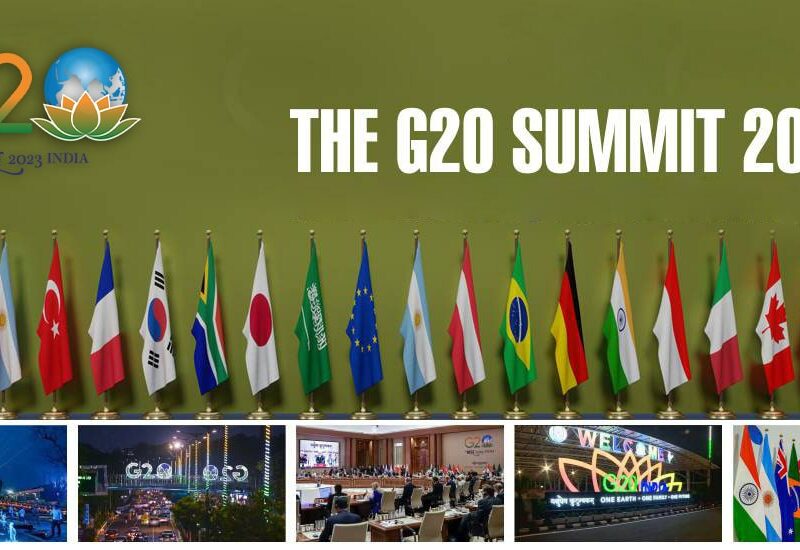The G20 (The Group of Twenty): A Nexus of Global Economic Collaboration stands as the paramount arena for international economic cooperation and decision-making! This grouping of 20 different countries includes Argentina, Australia, Brazil, Canada, China, France, Germany, India, Indonesia, Italy, Japan, Mexico, Korea, Russia, Saudi Arabia, and a whopping 85% of the world’s economic power! The G20 initiative was first introduced at the G7 summit in Cologne in June 1999! And it was formally launched on September 26, 1999, at the G7 Finance Ministers’ meeting. The inaugural assembly convened in Berlin on December 15–16, 1999! With the distinguished former Canadian finance minister Paul Martin assuming the mantle of its first chairman! while the venerable finance minister.
On September 4-5, 2016, the G20 summit met in Hangzhou, China, with the catchphrase. “An Innovative, Invigorated, Interconnected, and Inclusive World Economy” serving as its unifying theme.
Given India’s status as the world’s most expeditiously burgeoning major economy! its pivotal role in manifesting the summit’s thematic aspirations cannot be overstated.
The inception of the G20 arose from a palpable dissatisfaction within the international community regarding the G7 nations’! inability to proffer resolutions to the myriad conundrums besieging the global economy.
This juncture bore witness to the burgeoning recognition of middle-income nations and those wielding systemic economic influence.
As indispensable participants in the discourse seeking panaceas for global economic tribulations.
This conglomeration occupies a strategic vantage point! collectively constituting approximately 65% of the world’s populace, a staggering 79% of global commerce! and an imposing 85% share of the global economic landscape.
Within the hallowed chambers of various G20 assemblies, multifarious deliberations ensue, aimed at devising remedies to challenges that cast shadows over global economic growth.
Topics spanning finance, commerce, infrastructure and investments, energy resources, employment paradigms, the eradication of systemic corruption, developmental agendas, agricultural strategies, technological innovations, and the burgeoning digital economy all find resonance within these august gatherings.
In the realm of India’s vested interests, there exist several salient insights:
Terrorism and armed conflicts, as articulated in the G20 declaration, exert a substantial influence on the global economic landscape. Given that terrorism ranks paramount among the security apprehensions of the Indian administration, its inclusion within the G20 communiqué signifies a recognition of India’s concerns. India also commended the G-20’s endeavor to curb the financing of terrorist activities.
Originally, the proclamation urged the ratification of the Paris Agreement on Climate Change by 2016.However, because India and other developing countries are still in the early stages of economic development, full implementation of the Paris Agreement is still beyond of their immediate scope.
Poverty alleviation stands on equal footing with environmental preservation. Consequently, despite entreaties from the United States and China, the ultimate version of the declaration dispensed with the 2016 deadline, instead advocating for ratification by member governments at the earliest feasible juncture.
Curiously, the communiqué made no reference to a definitive conclusion regarding gasoline subsidies. Liquefied Petroleum Gas (LPG) garners the lion’s share of fuel subsidies in India, serving as the primary cooking fuel for a significant portion of the nation’s middle and lower-income populace.
Although global gasoline prices exhibit a continual descent, any abrupt cessation of fuel subsidies could potentially jeopardize India’s food security.
The G-20 initiative restated its unwavering commitment to abstain from engaging in competitive devaluation, which begets volatility and tumultuous fluctuations in exchange rates. Currency depreciation poses an adverse impact on the expansion of Indian exports.
The trajectory of future growth lies firmly in the hands of innovations, yet these innovations are also poised to forge fresh drivers of growth. Innovation assumes paramount importance in propelling India’s economic progress, which has lately fallen short of the 7% benchmark. The G-20 communiqué affirmed the G-20 Blueprint for Innovative Growth as a novel framework tailored to accommodate! the unique circumstances of each nation.
The G-20 collectively resolved to collaborate in the battle against base erosion and profit shifting (BEPS). India has ardently championed measures to curb BEPS in non-G-20 nations. BEPS encompasses intricate tax avoidance strategies that exploit loopholes and disparities in tax legislation to relocate earnings to low or tax-exempt jurisdictions.
Enhancing Domestic Infrastructure
Hosting the G20 summit furnishes India with an opportunity to channel investments into its domestic infrastructure, encompassing facets such as transportation and communication networks!
This endeavor not only ensures the successful execution of the summit but also lays a robust foundation for future economic expansion! and heightened living standards for its populace.
India stands as a nation characterized by a burgeoning and substantial population! and the enhancement of its infrastructure stands as an imperative prerequisite to meet the needs of its citizens and enterprises!
India has the opportunity to show its steadfast commitment to improving the standard of living for its citizens and creating a more prosperous and equitable society through its management of the G20 chair.
Navigating the Complexities Encountered by India’s G20 Participation
Disparities in Trade
The G20 A Nexus of Global Economic Collaboration : In recent times, the G20’s agenda has centered on fortifying the fundamental overhaul of the World Trade Organization (WTO). G20 leaders have recognized the urgent need to reinstate the dispute resolution mechanism! with the objective of fostering predictability and stability within the global trade framework!
In reali the G20 faces a multitude of hurdles that could obstruct the attainment of its trade goals and impede post-pandemic convergence.
The underlying challenge can be attributed to the diverse propositions advanced by G20 member nations concerning! the way forward for conflict resolution.
For example
;-the European Union has advocated for an extensive expansion of the Appellate Body (AB)! And a reassessment of AB membership criteria. Conversely, Canada has underscored the need to modernize trade regulations to ensure the WTO’s relevance in addressing contemporary trade complexities.
Moreover, despite a proposal for a Multi-Party Interim Appeal (MPIA)! put forth by a coalition of nations
This remedy proves to be short-lived, as only 22 out of the WTO’s 164 members! or a mere 6 of the 20 G20 constituents, have thus far endorsed this appeal.
Economic Recovery
While the G20 member nations concurred on augmenting the International Monetary Fund (IMF)! reserves through a novel Special Drawing Rights (SDR) allocation totaling US $650 billion, skeptics contend that this amount is inadequate, considering the scale of the financing predicament in emerging economies.
SDR allocation of about $3 trillion is deemed necessary by about 250 civil society organizations, but only $650 billion could be approved without the backing of the US Congress.
Divergence in Perspectives on Climate Change
The G20 member states have grappled with an insurmountable deadlock regarding climate goals!
many nations have expressed opposition to the idea of committing to limiting global warming to below 1.5 degrees Celsius and phasing out coal! The European Union, Canada, Japan, and the United States support limiting global warming to less than 1.5 degrees Celsius.
And ending coal use by 2025. On the other hand, countries like China, Russia, India, Saudi Arabia, and Turkey! continue to support the use of fossil fuels.
The EU and the 19 most powerful economies in the world make up the G-20 coalition. The G-20 has been a group-based (g20 wikipedia in hindi), non-hierarchical organization that has been crucial in advancing global commerce.




